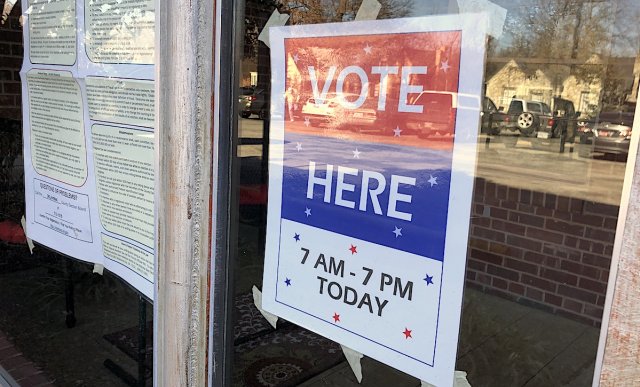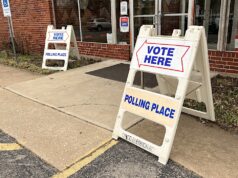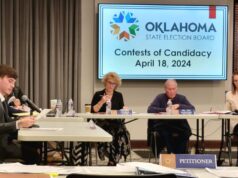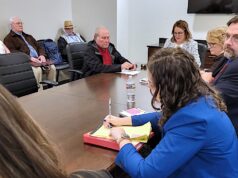Oklahomans have until Friday, June 5, to register in time to be eligible to vote in the primary election on June 30.
This primary season, voters will have the chance to vote for local and state legislators and sheriffs and weigh in on a ballot measure that would expand access to Medicaid in the state.
Owing to continued health concerns resulting from the novel coronavirus, absentee voters don’t have to get their ballots notarized this election and can provide photocopied proof of identification instead.
In-person voting will also be subject to additional safety protocols, including disinfection of voting stations and social distancing. Voters are encouraged to wear a mask.
“As the State of Oklahoma continues its phased reopening, the health and safety of election workers and voters remains foremost on the minds of state and county election officials,” Paul Ziriax, secretary of the Oklahoma State Election Board, wrote in an email. “Oklahomans should know that state and county election officials are working very hard to make sure elections are conducted as safely and securely as possible.”
Below are details on how to register to vote and how to request and submit an absentee ballot. You’ll also find information on the key issues you can expect to see on your ballot June 30.
How to register
By Friday, go to the State Election Board’s voter registration page. You can either download an application or use the online voter registration tool. According to Ziriax, applications are also available at county election boards, tag agencies and post offices. Completed applications must be mailed to the state election board and postmarked by June 5, or dropped off at a county election board.
In order to register to vote, you must be a citizen of the United States, a resident of Oklahoma and at least 18 years old by the day of election. Individuals convicted of a felony can register if they have fully completed their sentence, including parole and probation.
Oklahoma has a partially closed primary system. The Democratic Party allows both Democrats and independents to vote in its primary elections, but the Republican and Libertarian primaries are open only to party members.
Voting absentee
Absentee ballots can be requested through the Oklahoma Voter Portal, under the “voter services” tab. Make sure the correct mailing address is on file before starting the process; this address can also be updated in the portal. You will be asked to declare why you are requesting a ballot, but all answers are eligible to receive ballots absentee.
The ballot packet will include your ballots, envelopes and an instruction sheet. This election, voters may receive two sheets, one of which was printed before changes were made to the absentee-voting process because of COVID-19.
When filling out the ballot, use a blue or black pen. Be sure to fill in the box of your selection completely to ensure your vote will be counted. Before sending the ballot in, you must either have it notarized or include a copy of a valid form of ID.
If you choose to get your ballot notarized, take the ballot envelope and the affidavit envelope to a notary of the public. Most UPS stores and tag agencies have notaries, but you can also look up notaries in your area. Notaries in the state of Oklahoma may not charge for notarizing ballots.
If you choose to provide proof of identification instead, you must photocopy the form you choose and include it in your affidavit envelope. You must also still sign the affidavit. Acceptable forms of identification include valid state, federal, armed forces or tribal photo ID or a voter identification card. Oklahoma medical marijuana cards also qualify as state-issued identification.
Ballots must be received by the election board by June 30. They can also be returned by hand to your county election board by the day before the election. You can check the status of your ballot under the “absentee ballots” tab on the Voter Portal website.
In-person absentee voting, also known as early voting, will take place at county election boards at the following times:
- Thursday, June 25 (8 a.m. to 6 p.m.)
- Friday, June 26 (8 a.m. to 6 p.m.)
- Saturday, June 27 (9 a.m. to 2 p.m.)
What’s on the ballot
This election, Oklahomans will have the chance to vote on State Question 802, which proposes expanding Medicaid coverage to those between 18 and 65 who are not already covered and whose annual income is at or below 133 percent of the federal poverty line. It would also prohibit the state from making any laws that would make it more difficult to qualify for this expanded coverage. The expansion would be jointly funded by the federal and state governments.
Oklahoma is one of 14 states that have not expanded Medicaid. The expansion would likely make about 230,000 additional Oklahomans eligible for coverage.
All Democrats, Republicans and Independents will also be eligible to vote in the primaries for the U.S. Senate seat currently held by Sen. Jim Inhofe (R-OK). Four Democrats (Sheila Bilyeu, Elysabeth Britt, Abby Broyles and R.O. Joe Cassity) are running to challenge Inhofe in the general election, and Inhofe is facing three challengers (Neil Mavis, JJ Stitt and John Tompkins) in the Republican primary.
Republicans across the state will also be voting in the primary for an Oklahoma Corporation Commission seat, choosing between incumbent Todd Hiett and challenger Harold Spradling.
Most voters will also have the opportunity to vote in the primary for a U.S. House seat, with the biggest primary taking place in Congressional District 5, where nine Republicans have registered to challenge Rep. Kendra Horn (D-OK5).
Voters in 12 State Senate districts and 38 State House districts will also face a choice in the primary, depending on their party affiliation. More information about these races will be posted by NonDoc before June 30 and can be found here.
Finally, many voters will be voting in primaries for local offices, including sheriff and court clerk races.
Additional information about voting in the primary can be found on the Oklahoma Election Board’s website.






















